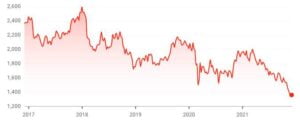The body armor industry is one of the fastest-growing industries today. While buying body armor stock from a manufacturer can be challenging, buying stock from ballistic material manufacturers is much easier.
To assist you in navigating and capitalizing on the dynamic body armor market, we have pinpointed eight reputable companies listed on the stock exchange.
Exploring Body Armor Stocks: Our Top Picks
Within this article, we present eight companies that serve as suppliers of protective materials to body armor manufacturers, enabling the production of cutting-edge body armor.
Avient Corporation
Avient Corporation (NYSE: AVNT) is an American company involved in protective materials that has recently purchased the Dyneema® division from DSM. Dyneema® is a composite unidirectional laminate that offers excellent energy absorption and enhanced protection, all in a lightweight solution. The company’s stock market capital is around 3,87 billion USD.
Over the past five years, Avient Corporation’s valuation has increased by approximately 40%, with a notable 23% rise in 2023 compared to the previous year.
As of February, 2025, Avient’s stock is trading at $42.31. Analysts have set a 12-month average price target of $55.50, suggesting a potential upside of about 31%.
The company is projected to experience annual earnings growth of 18.2% and revenue growth of 4%.
Avient Corporation’s stock market chart for the past five years:
DuPont de Nemours
DuPont (NYSE: DD) is an American multinational corporation specializing in various commercial facets of chemistry and currently boasts a global workforce of approximately 24,000 employees, solidifying its status as one of the world’s largest chemical corporations.
It advanced greatly during the 20th century as it developed more than a dozen resistant and defensive materials. Among these is one of the most famous materials in the body armor industry: Kevlar®.
The company, like many others, faced challenges during the COVID-19 pandemic but has demonstrated resilience over the past few years. As of February 11, 2025, DuPont’s stock is trading at $81.48, reflecting a significant recovery.
In the fourth quarter of 2024, DuPont reported adjusted earnings per share of $1.13, surpassing analysts’ expectations of $0.98. The company also raised its 2025 profit forecast, driven by strong demand in the electronics sector, particularly for semiconductors used in AI technology.
Over the past five years, DuPont’s stock has appreciated by approximately 11%, indicating a positive trend in the company’s valuation.
Overall, DuPont showcases impressive earnings and valuation fundamentals, underscoring its robust position in the market.

More about Kevlar®
Discovered in 1965, Kevlar’s commercialization began nearly a decade later, facilitated by DuPont. Renowned for its lightweight and high durability, Kevlar finds versatile applications, including ballistic panels, owing to its exceptional characteristics.
Honeywell
Honeywell (NYSE: HON) is an American multinational corporation that manufactures consumer goods, technical services, and aerospace systems for a diverse range of clients. Other products and sectors Honeywell operates in are telephone receivers and chronotermostats.
Honeywell is largely known for the manufacturing of the materials Spectra Shield®, Gold Flex® and Gold Shield®.
This company has demonstrated significant growth over the past five years. The company’s market capitalization currently stands at approximately $135.59 billion USD.
In 2020, Honeywell’s stock experienced a decline, reaching $136 per share in May 2020, primarily due to the global COVID-19 pandemic. This downturn was largely attributed to challenges in its aerospace segment, which was significantly impacted by reduced air travel during the pandemic.
In October 2024, Honeywell announced plans to spin off its advanced materials division into a separate publicly traded company. This move aligns with CEO Vimal Kapur’s strategy to streamline operations and focus on core segments such as aviation, automation, and energy.
As of February, 2025, Honeywell’s stock is trading at $206.94 per share.

Materials:
Spectra Shield®
Spectra Shield is A complex material that usually forms part of body armor and armed vehicles. As Honeywell states:
“Spectra is 15 times stronger than steel, yet light enough to float. It is made from ultra-high-molecular-weight polyethene using a patented gel-spinning process.” In other words, it mixes two important characteristics for body armor: resistance and flexibility.
Gold Shield®
Gold Shield GN-2117 is a soft body armor material. It is normally used for military and police vests. It is formed by mixing Shield technology with aramid fibre. This product also has chemical resistance, which makes it perfect for creating body armor for the military. It is resistant to chemicals because it has resin and a coating system. Gold Shield “has demonstrated up to a 10% weight reduction when compared to Honeywell’s traditional Gold Flex material, which is also used in soft armor applications.”
Gold Flex®
Is a non-woven material, normally used in ballistic vests and body armor. It is very light since it is a laminated material with cross-laid fibres. These fibres are laid straight, and not woven. This allows the resistance to bullet penetration to increase.
Gold flex can be interspersed with other panels to increase its hardness, without losing the flexibility and comfort that this material generates.
Cadre Holdings Inc
Cadre Holdings Inc (NYSE: CDRE) is an American corporation, based in Jacksonville, Florida. It owns multiple body armor manufacturers including Safariland, GH armor, Pacific Safety Products and Protect Armor Systems.
Cadre Holdings has demonstrated significant growth in recent years. As of February, 2025, the company’s stock is trading at $36.43 per share, with a market capitalization of approximately $1.47 billion.
Over the past three years, Cadre Holdings’ stock price has increased by approximately 239%, reflecting the company’s strong performance and growth potential.
Analysts maintain a “Strong Buy” rating on CDRE, with a 12-month average price target of $39.75, indicating confidence in the company’s future prospects.
Given its robust growth trajectory and favorable analyst outlook, Cadre Holdings presents an attractive opportunity for investors.


Teijin
Teijin Limited is a chemical, pharmaceutical, and information technology company headquartered in Japan. The company’s core areas of business are high-performance fabrics such as aramid, carbon fibres & composites. Outside the body armor industry, Teijin operates in the sectors of healthcare, films and IT products.
Teijin Limited (TYO: 3401) faced significant challenges in 2020 due to the global COVID-19 pandemic, which adversely affected its financial performance. The company experienced a partial recovery in 2021, but this was followed by a rapid decline in subsequent years.
As of January, 2025, Teijin’s market capitalization is approximately $1.63 billion USD, reflecting a 9.26% decrease over the past year.
In the fiscal year ending March 31, 2024, Teijin reported mixed financial results. Despite operational challenges, the company’s adjusted operating income increased by 46.7% to ¥25,632 million, driven by stronger performance in specific sectors.

Materials:
Twaron® and Endumax® are two Teijin trademarks. Body armor manufacturers use Endumax® to make hard armor options and Twaron® for ballistic vests.
Teijin describes Twaron as “the preferred para-aramid product for manufacturers who want to deliver products that are stronger, lighter, and more resistant. With its unique combination of mechanical properties, chemical resistance, excellent durability and thermal stability, Twaron® can transform a normal product into an extraordinary one.”
Eundmax is 11 times stronger than steel and it can be used from ballistic shields and airfreight cargo containers to nets. In other words, it is extremely versatile and resistant.
Hyosung
Hyosung Corporation (KRX: 004800) is a prominent South Korean conglomerate with diversified interests, including textiles, chemicals, and industrial materials. The company is renowned for its high-performance aramid fibers marketed under the brand name “TANSOME®,” which are known for their exceptional strength, heat resistance, and lightweight properties.
In 2021, Hyosung Advanced Materials invested 61.2 billion won (approximately $44.7 million) to boost production at its Ulsan plant from 1,200 tons to 3,700 tons annually, reflecting the company’s commitment to meeting the growing global demand for aramid fibers.
Financially, as of September, 2024, Hyosung reported a trailing 12-month revenue of $2.75 billion.
Despite challenges posed by the COVID-19 pandemic, Hyosung has demonstrated resilience and strategic growth, particularly in its aramid fiber production, positioning itself as a key player in the global market.

Navigating the intricacies of the body armor stock market can be challenging, but we aspire to provide a glimpse into some of the prominent companies in this sector.
Given the inherent volatility of the stock market, it’s prudent to remain vigilant and stay attuned to potential changes and emerging news. Keeping a keen eye on market dynamics will better position investors to adapt to evolving conditions and make informed decisions.












